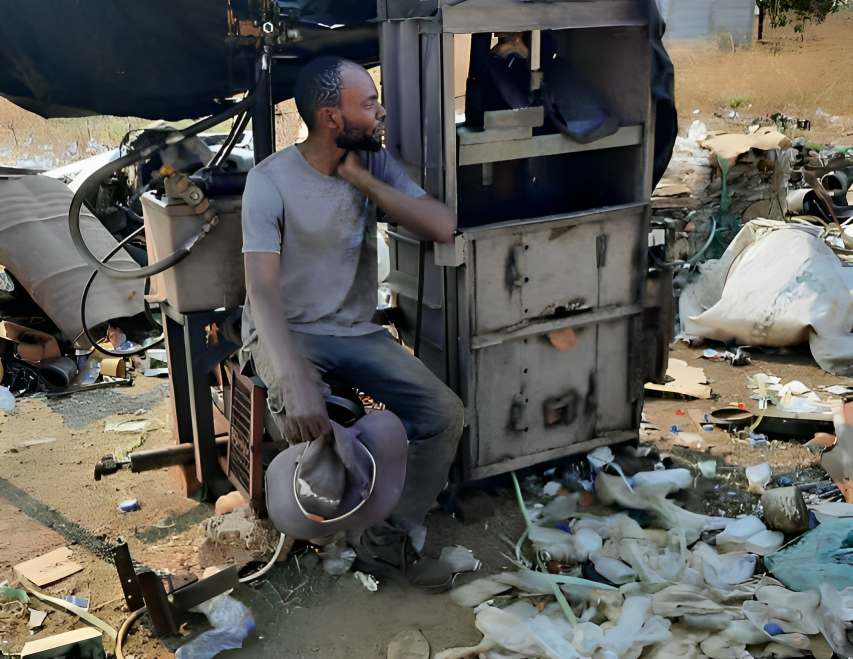In the realm of addressing the global challenge of climate change and the problems that arise from it, entrepreneurs play a paramount role. As Plato, the renowned philosopher, once stated, “Necessity is the mother of invention.” This timeless quote encapsulates the driving force behind innovative solutions that emerge from pressing needs. While discussions surrounding these initiatives often prioritize the perspectives of scientists and policymakers, it is crucial to acknowledge that the power of invention extends far beyond the realms of education and traditional innovation.
To truly understand the potential for positive change, it is imperative to recognize the catalytic role of entrepreneurs, particularly in underrepresented communities and minority groups. These individuals approach problem-solving with an entrepreneurial mindset, seeking out innovative solutions that transcend the boundaries of scientific or policy-driven approaches.
One key characteristic that distinguishes entrepreneurs is their unwavering commitment, driven not only by financial gain but also by their relentless pursuit of surpassing competition. This inherent drive fuels the efficient execution of their endeavors, propelling progress forward. Moreover, this exceptional characteristic can be harnessed to accelerate efforts in mitigating the root causes of climate change, including achieving the ambitious goal of reaching net-zero emissions.
Entrepreneurs, whose livelihood relies on the success of their ventures, possess a heightened motivation to excel in their chosen industries. Their bottom-up approach to problem-solving presents a valuable opportunity to tackle waste management and the associated climate-related issues. By addressing these challenges at the grassroots level, entrepreneurs can make significant strides in reducing greenhouse gas emissions and fostering sustainable practices.
The dedication and resourcefulness of entrepreneurs have the potential to revolutionize waste management systems, inspiring innovative solutions that have far-reaching environmental implications. Leveraging their unique perspectives and drive, entrepreneurs can spearhead initiatives that not only address waste management but also contribute to broader sustainability goals.
By aligning the interests of entrepreneurs with the urgent need for climate action, we can harness their remarkable capacity to drive meaningful change. Their success stories serve as powerful beacons of inspiration, demonstrating how individual determination can pave the way for transformative environmental impact.
A collaborative approach acknowledges the importance of empowering underrepresented groups whose livelihoods are intertwined with waste management enterprises. This recognition presents a significant opportunity to accelerate progress towards a more sustainable future, actualizing our collective vision of a world with reduced emissions, improved waste management practices, and thriving communities.
Efforts to address the causes and impacts of climate change are distinct from ventures like agriculture, where entrepreneurs directly benefit from their endeavors. In the case of climate change, there is often no immediate or direct financial incentive to solve these complex problems. Historically, the responsibility and financing for climate change mitigation and adaptation initiatives have predominantly relied on governments and civil society organizations. However, this approach has faced challenges, and climate change continues to pose a formidable threat to all aspects of economic growth.
For instance, in Zimbabwe, the responsibility for waste management primarily lies within government bodies and city council entities. However, government-operated waste management activities have been marred by inefficiencies, sparking debates about the merits of public versus private-run institutions.
Conversely, entrepreneurs, particularly those operating informally and belonging to underrepresented groups, have a direct and compelling incentive to actively participate in efficient waste management systems. Their livelihoods depend on effective waste management practices, creating a natural alignment between their economic interests and the broader goals of environmental sustainability.
By recognizing the vital role of these entrepreneurs and empowering them with the necessary resources, we can tap into their expertise and entrepreneurial spirit to establish more robust waste management systems. This inclusive and participatory approach addresses immediate environmental concerns while also generating positive economic and social outcomes.
Through the active engagement of entrepreneurs, especially those from marginalized backgrounds, we bridge the gap between the imperative for climate action and the practical solutions needed. Their direct involvement and aligned incentives offer a powerful catalyst for advancing efficient waste management practices and fostering sustainability. By empowering these entrepreneurs and providing them with the support they need, we not only achieve positive environmental outcomes but also promote inclusive economic growth and resilient communities.
This blog exemplifies the spirit of entrepreneurship and draws inspiration from an extraordinary young Zimbabwean from a small town, Kuziva Ravis Chindanga. After enduring years of unemployment, shouldering the responsibility of providing for his family, and lacking formal education, he embarked on a remarkable journey. Driven by sheer determination, he created a groundbreaking solution for solid waste management in Zimbabwe—an innovation that holds immense promise for a greener future, if only there are properly designed systems to empower youths like him across the globe.
This blog stands as a testament to the indomitable human spirit and the transformative power of necessity-driven invention. Through the remarkable story of this Zimbabwean entrepreneur, we witness firsthand how a single individual can make a profound impact on their community and inspire change on a global scale.
By clarifying the central theme, strengthening the introduction with historical significance, and streamlining the flow for seamless transitions, this excerpt provides a more focused and coherent exploration of the role of entrepreneurs in addressing the challenges of climate change.
Kuziva Ravis Chinganga’s Journey: Poverty Necessitated Waste Management Driven Innovation
Kuziva Ravis Chindanga is an inspiring young Zimbabwean entrepreneur hailing from Norton, a small town located 80 kilometers from Zimbabwe’s capital city. His remarkable story resembles something from a movie, shining a light on the transformative power of poverty-driven innovations and entrepreneurship in tackling climate-related issues.
I had the privilege of meeting Kuziva when I initially helped him secure a job at a textile company owned by an Indian entrepreneur. However, fate brought us together again when Kuziva approached me with a burning ambition to forge his own path. Struggling to make ends meet and with a growing family to support, he realized the urgent need to devise a plan that would secure a better future for his children.
One day, Kuziva shared his aspirations with me. He expressed his desire to venture into entrepreneurship and start his own waste management enterprise. To be honest, I had my doubts. I questioned him about the financial challenges and the lack of a proven intervention in the field. However, Kuziva’s unwavering determination and optimism shone through in his response. He simply declared, “Then I will create one.”
At that moment, I couldn’t help but feel a mix of sympathy and skepticism. After all, Kuziva lacked an engineering background and had only passed his Ordinary Level studies with difficulty. Moreover, he did not possess a mathematical background, which made me wonder how he planned to achieve his ambitious goals.
Nevertheless, I listened attentively as Kuziva laid out his plan. Armed with an engineering textbook and an old model smartphone that provided limited internet access, he intended to use online tutorials to learn the skills necessary to build his own waste baling machine. Despite the challenges of accessing the internet, which required an 80-kilometer journey from his small town to my house, and the need to borrow a memory card due to limited phone storage, Kuziva remained undeterred.
To acquire the necessary materials, he undertook a determined mission to gather discarded vehicle parts and various scrap metal from nearby scrapyards. This resourceful endeavor showcased his ingenuity in repurposing these materials for his waste baling machine. Remarkably, Kuziva stumbled upon a fortuitous solution to the exorbitant electricity expenses in Zimbabwe. By establishing his workshop within the garage of a trusted friend residing in the quarters of the National Power Station staff, he gained access to readily available electricity as a perk of their employment.
Throughout this entire journey, I couldn’t shake off a sense of responsibility to support Kuziva, even if it meant providing him with a semblance of belief. Then, one year and six months later, Kuziva called me with incredible news—the baling machine he had built was not only completed but also successfully tested at the Zimbabwean National Railways Company Engineering section.
Filled with a mix of skepticism and concern for his safety, I visited Kuziva’s operational site—an open space constrained by limited resources. However, what I saw left me immensely impressed. The heaps of solid waste that he had collected and compacted for export to South Africa spoke volumes about his dedication. Kuziva had accomplished what formal institutions often struggled to achieve due to financial constraints. While excuses of fuel shortages and inefficient waste collection plagued the waste management landscape in Zimbabwe, Kuziva ingeniously crafted a hand-pushed cart to collect and compact waste, laying the foundation for effective waste management and contributing to the circular economy.
Kuziva’s journey serves as a powerful reminder of the untapped potential within Zimbabwe’s unemployed youth. Despite lacking access to resources and support, many of them recognize the opportunities within waste management. They possess the drive and determination to contribute meaningfully to the waste management value chain, much like Kuziva. However, their lack of access to the internet, availability of free electricity, or educational resources like engineering textbooks often hinders their progress. Nonetheless, given the opportunity, these individuals would undoubtedly give their all to become efficient players within the waste management sector and contribute to the circular economy.
Kuziva’s story is an inspiration that demands immediate attention and recognition. It highlights the need to view impoverished and underrepresented groups, particularly in Southern Africa, as capable and reliable contributors to achieving the goals of the circular economy. Their motivations, driven by the necessity to provide for their families, offer a unique perspective and call for further exploration and strategic funding to bridge the policy gap.
Kuziva’s journey symbolizes the power of grassroots innovation and underscores the urgency of empowering marginalized communities in our collective pursuit of a sustainable future.
Author
-

Linda Kachona is a 1 Millions Young Action Ambassador and an Agricultural Economist specializing in Agribusiness Management has equipped with a deep understanding of the challenges facing the agriculture industry and the skills needed to navigate them successfully.



